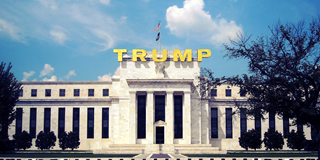Jerome Powell, US President Donald Trump's pick to succeed Janet Yellen as Fed Chair, will face some extraordinary challenges at the outset of his five-year term. But the greatest challenge of all will be to stay out of Trump's shadow and uphold the Fed's independence.
CAMBRIDGE – With the appointment of Jerome Powell as the next Chair of the United States Federal Reserve Board, Donald Trump has made perhaps the most important single decision of his presidency. It is a sane and sober choice that heralds short-term continuity in Fed interest-rate policy, and perhaps a simpler and cleaner approach to regulatory policy.
Although Powell is not a PhD economist like current Fed Chair Janet Yellen and her predecessor, Ben Bernanke, he has used his years as an “ordinary” governor at the Fed to gain a deep knowledge of the key issues he will face. But make no mistake: the institution Powell will now head rules the global financial system. All other central bankers, finance ministers, and even presidents run a distant second.
If that seems hyperbolic, it is only because most of us don’t really pay attention to the Fed on a day-to-day basis. When the Fed gets it right, price stability reigns, unemployment remains low, and output hums along. But “getting it right” is not always easy, and when the Fed gets it wrong, the results can be pretty ugly.

CAMBRIDGE – With the appointment of Jerome Powell as the next Chair of the United States Federal Reserve Board, Donald Trump has made perhaps the most important single decision of his presidency. It is a sane and sober choice that heralds short-term continuity in Fed interest-rate policy, and perhaps a simpler and cleaner approach to regulatory policy.
Although Powell is not a PhD economist like current Fed Chair Janet Yellen and her predecessor, Ben Bernanke, he has used his years as an “ordinary” governor at the Fed to gain a deep knowledge of the key issues he will face. But make no mistake: the institution Powell will now head rules the global financial system. All other central bankers, finance ministers, and even presidents run a distant second.
If that seems hyperbolic, it is only because most of us don’t really pay attention to the Fed on a day-to-day basis. When the Fed gets it right, price stability reigns, unemployment remains low, and output hums along. But “getting it right” is not always easy, and when the Fed gets it wrong, the results can be pretty ugly.